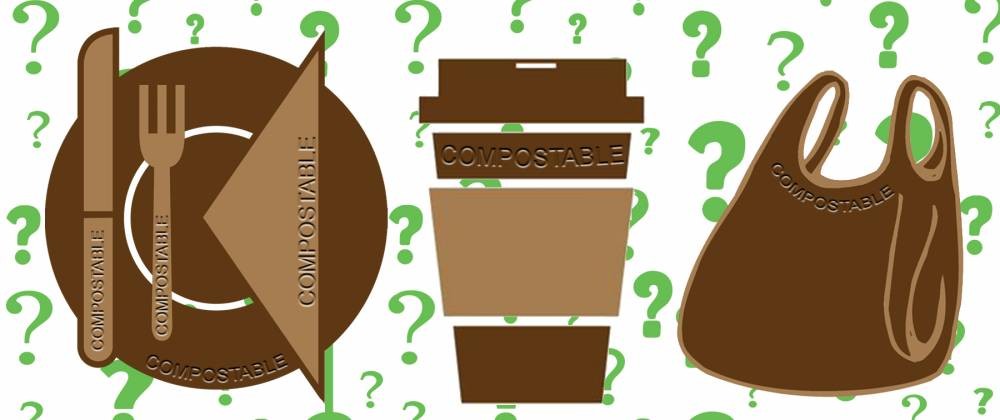Green Blog
Resilient Recycler: Are products labeled as "compostable" really better for the environment?
You may have noticed a recent increase in the availability of products labeled as "compostable" at event venues, restaurants, and supermarkets. Throughout the country people are hearing more about waste, recycling, and the environment. This is motivating a lot of people to find ways to decrease the amount of waste they're sending to landfills, largely through recycling and composting. Composting is a great way to recycle nutrients back into our soils. Healthy, nutrient-rich soils is essential for growing our food, clothing, and producing many of our consumer goods. Without composting, those soils are less productive. Nutrients are a renewable resource, but only if we return nutrients to the soil through composting. While composting organic materials such as food scraps and yard debris provides numerous environmental benefits, many products labeled as compostable have proven to have negative impacts on the environment. Common products labeled as compostable include single-use cutlery, dining ware, bags, and packaging. Why aren't these products the answer for living more sustainably?
1. "Certified Compostable" may not mean what you think.
Not all products containing the "certified compostable" label have the ability to rot or break down quickly enough to be composted alongside food scraps and yard debris at commercial compost facilities. When these products don't break down, they contaminate the final compost product (because you're not going to want to buy a bag of compost for your garden that has chunks of dining ware and cutlery in it!). The increase in contamination from these products burdens compost facility operators and increases both economic and environmental costs.
2. It takes a lot of energy and natural resources to make "compostable" products.
For most products we use, the greatest environmental impact comes from the manufacturing and transport of that product, rather than the impacts of its recycling or disposal. This is true for products labeled as "compostable", too, but even more so; compostable products require more energy and cost more to manufacture than traditionally-produced single-use products. The Oregon Department of Environmental Quality recently published a study of the environmental impacts of various products and packaging where they compared items labeled as compostable versus traditional single-use items. They found that the items labeled as compostable had greater negative environmental impacts than the traditional items for 88% of products they studied. Using an analysis of the environmental impacts throughout the "life-cycle" of these products, from manufacture to use and disposal, the study found that compostable materials often require more fossil fuels and generate more greenhouse gas emissions to create than their traditional, non-compostable counterparts.
3. They can contain toxic chemicals.
There are a number of compostable paper-based products that contain toxic chemicals. When these products are tossed into compost bins, the toxins can leach into the compost and negatively impact people and the environment. One of these toxic compounds most commonly used in compostable products is perfluorinated alkyl substances (PFAS), which can work their way into our food through compost added to soil. PFAS compounds are used to create the resistance to water and grease we expect from single-use dining ware, but they also endanger our health and have been linked to negative impacts on child development and increased risk of some cancers.
4. Products labeled as "compostable" usually cost more.
Compostable products are more expensive to make, and those costs are passed on to the consumer. While many environmentally-conscious consumers are willing to pay more for products with lower environmental impacts, the environmental benefits of compostable products (or lack thereof) don't justify the increased price.
5. You wouldn't want to try to compost these products at home.
Compostable products won't break down even after several trips through commercial composting facilities where the piles reach temperatures high enough to kill germs and sterilize any seeds. Your backyard compost pile doesn't get nearly as hot, and while you could maybe get these compostable products to break down eventually, it would take a lot of time, water, and energy.
6. "Compostable" products prohibit compost from being used in organic farming.
Certified organic farms heavily depend on compost, in lieu of synthetic fertilizers, to grow their crops. USDA organic certification requirements prohibit the use of compost that included any type of compostable packaging or products in its source materials. Use of compostable products reduces the supply of compost that meets this requirement, making it more difficult and expensive for organic farmers to maintain USDA organic certification.
7. "Compostable" plastic packaging does not degrade, especially in marine environments.
About 10% of the world's plastic ends up in oceans. Much like traditional plastics made from fossil fuels, compostable plastic will not degrade or decompose in marine environments. Instead, those products will further contribute to oceanic plastic pollution.
If not compostable products, what is the solution to create less packaging and product waste?
Many of the compostable products on the market today are designed to be used only once and disposed of. Consider reusable alternatives to single-use products even if they're labeled as recyclable or compostable. Remember, composting food scraps and organic debris is a great way to divert waste from the landfill and recycled nutrients back into the soil, but products labeled as "compostable" can cause a number of problems for composting facilities and the environment.
Check out this video to see food waste go from a Clark County school to Dirt Hugger, a commercial composting facility in the Gorge.




